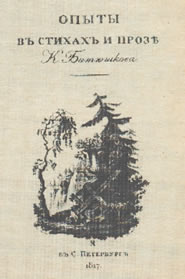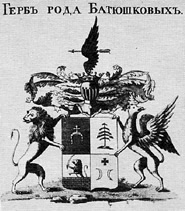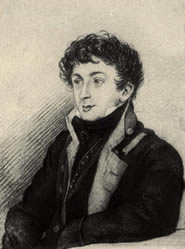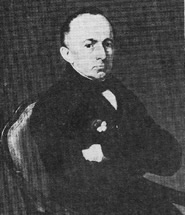|

Cover to "Experiments in
Poetry and Prose" (1817)
|
1787
Born on 18 May in Vologda to Nikolay L'vovich Batiushkov
and his first wife, Aleksandra Grigor'evna (nee Berdyaev).
Shortly after giving birth to Konstantin Nikolaevich, her
fifth child but first son, Aleksandra Grigor'evna suffered
a nervous breakdown and spent the rest of her days in various
sanatoria away from her family. She died in St. Petersburg
in 1795.The Batiushkovs were among the wealthiest and most
well-connected families in the empire up until the time
of poet's great uncle, whom Ekaterina II exiled for involvement
in an attempt to dethrone the empress. The poet's father
had been sullied by the scandal, as he had been forced to
inform on his uncle, and spent his adult life in self-imposed
exile on his estate. There he could avoid political intrigue
while cultivating both a warm and productive home life and
and an extensive library (especially of French literature
and contemporary continental philosophy).
1797- 1801
Father takes the poet to St. Petersburg to begin formal
education. Up until this point, K.N. studies under the supervision
of his older sisters at the estate at Daniilovsky. Spends
the next four years at Jacquinot's boarding school, where
he excels at languages and history. He transfers to Tripoli's
boarding school. Platon Apollonovich Sokolov, a friend of
the poet's father, oversees K.N.'s education and convinces
him to begin translating. The first published work of Batiushkov's
career is thus a liturgical document from the Russian into
German, dedicated to Sokolov.
1803-1804
Withdraws from school to begin professional life. The
poet is taken under the wing of another family associate,
a distant uncle, M.N. Murav'ev, who was one of the first
graduates of Moscow University, a high-ranking official,
and himself a popular poet, founder of the Sentimentalist
school in Russian verse. Murav'ev organizes the young poet's
living arrangements (in his own home) and his first position
as clerk in the Department of Public Education. Murav'ev
ensures that Batiushkov would continue studying. He provides
Batiushkov not only with a more "classical" education
(history, Latin, Ancient Greek, rhetoric, and world literature),
but also tempers his studies with the belief that writing
and study must not exist in isolation, sowing the seed of
the stylistic flexibility and generic ambiguities that constitute
Batiushkov's break with, and contribution to, Russian poetry.
Falls into company with his Department mates I.P. Pnin,
D. I. Yazykov (the poet's father),
and N.A. Radishchev (the writer's son), and is associated
with members of the Olenin Circle, who advocate the creation
of a specifically Russian national literature. Begins writing
verse.
1805
First publication, Послание к моим стихам ("A letter
to my poems"), is a satire of contemporary literary
life in Russia. The poet, very much in the Romantic style
that he helped adapt to the Russian scene, fashioned himself
as an ironic, hedonistic, and somewhat disenchanted character.
He uses his command of both domestic and Western European
Classical, Neoclassical and Sentimentalist verse styles
to point out their limits and his poetry, unlike most of
the popular poetry that precedes it in Russia, celebrates
the sensuous and the adventurous.
1807-1810
In keeping his life in line with his writing, Batiushkov
volunteers for military service, participates in the Prussian
campaign, where he is wounded. Writes elegies based on military
and romantic experiences of this period (notably Воспоминания
1807 года ("Memories of 1807"), 1809) which become
stylistic benchmarks in the development of the form. Also
during this period, Batiushkov begins verse translations
of Italian and French works (especially of Tasso), which
begin to influence his own writing and for which he is able
to experiment with more stylistic freedom. After a period
of considerable productivity and the death of Murav'ev,
K.N. leaves for the Swedish campaign in Finland, where he
becomes ill. Having regained most of his health, returns
to the capital. Sister dies. Composes Видение на берегах
Леты ("Vision on the Banks of the Lethe"), which
gains him notoriety as a satirist, and in which he expresses
disregard for all Russian writers but Karamzin,
Krylov and Derzhavin.
In the satirical works (which were circulated among literary
circles but were officially published only much later),
Batiushkov aligns himself more and more with Karamzin, until
finally he moves to Moscow (also spends time in Nizhnii)
and begins publishing mainly in Karamzin's journal Vestnik
Evropy (Herald of Europe). Satire not only allows K.N. to
demonstrate his loyalties, but also gives him opportunity
to mix themes and styles in an unprecedented way.
1812-1814
Returns to St. Petersburg and is briefly employed as an
assistant to Krylov in the Imperial Public Library. Leaves
for the Napoleonic war, where he is twice decorated. When
he returns to Russia, both his demeanor and writing change
considerably. His personal behavior becomes unpredictable,
displaying gradually more frequent episodes of paranoia,
and he all but abandons his light, satirical style for a
sullen, more personal mode. His elegies on the war (К Дашкову
and Тень друга ("To Daskov" and "Shodow of
a Friend")), on -- mostly unrequited --love (Мой
гений ("My Inspiration"), Разлука ("Parting"))
and on his impressions of Europe seen during the war (Переход
через Рейн ("Crossing the Rhine")) do much to
expand the thematic possibilities of the form, including
now internal psychology and historical perspective.
1815-1817
Continues military service, first in Bessarabia then in
the Household Guards in the capital, before retiring to
civil post in 1816. Meanwhile he takes part in Zhukovsky
and Uvarov's Arzamas and in The Lovers of the Russian
Word. The publication of his collected works, Опыт в стихах
и прозе ("Experiments in Poetry and Prose") (see
left), marks the climax of Batiushkov's career, both in
popularity and productivity. The two volumes include several
unpublished works (typified by Умирающий
Тасс ("Tasso Dying")) that highlight the poet's
generic innovation, not to metion emotional depth and sensitivity.
Becomes acquainted with the young A.S
Pushkin and Vyazemsky.
Father dies.
1819-1821
Selected to serve in diplomatic corps, moves to Italy, where
he focuses on prose (mostly criticism) and his epigrammatic,
or anthological, poems. Suffers increasing paranoid delusions
and hypochondria, eventually to the extent that officials
release him from his professional obligations.
1822-1833
Battles unsuccessfully with mental illness. Returns to Russia.
Due to moribund condition, the poet's literary career all
but completely ends. His acquaintances, namely Zhukovsky
and Krylov and later Vyazemsky and Pushkin (who edited and
published K.N.'s adaptation of Byron's Childe Harold),
encourage their colleague to continue writing and publishing,
and they work on his behalf to ensure him sustained credibility
and income. Travels abroad to sanatoria and stays in the
Maison de sante in Saxony from 1924-1928. Returns to Moscow,
where he stays until 1933.
1934-1855
Friends in publishing collect and publish a group of poems
and prose pieces (including
Ты знаешь, что изрек... ("Do you know what gray Methuselah...")
and "Изречение Мельхиседeка ("Apophthegm of Melchizedek")),
which constitute the poet's last extant poems. Suffers ultimate
breakdown and moves to Vologda to his family estate at Daniilovsky,
where he lives in convalescence until his death in 1855.
Dana Fuller
Bibliography
of critical works on K. N. Batiushkov
|

The Batiushkov family crest

Batiushkov in 1815

Batiushkov in the 1850s.
|